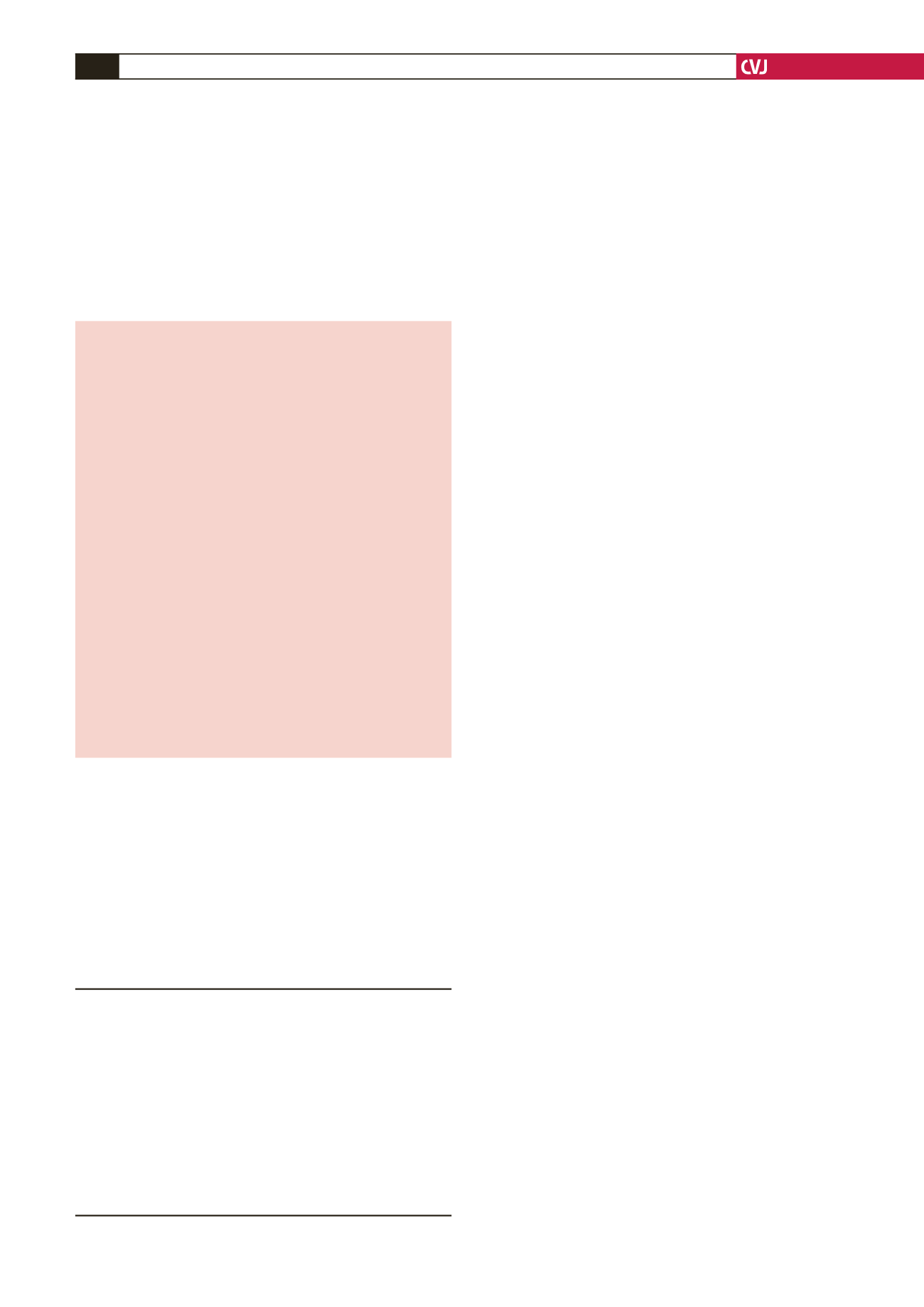

CARDIOVASCULAR JOURNAL OF AFRICA • Volume 27, No 5, September/October 2016
328
AFRICA
Patient outcomes following after-hours and weekend
admissions for cardiovascular disease in a tertiary
hospital in Calabar, Nigeria
Victor Ansa, Akaninyene Otu, Affiong Oku, Uchenna Njideoffor, Charles Nworah, Clement Odigwe
Abstract
Background:
There are various reports of higher mortal-
ity rates occurring after admissions over the weekend and
during after-hours. This study aimed to determine if there
was a difference in mortality rates occurring during the week-
end and after-hours among cardiovascular admissions in a
tertiary hospital in Nigeria.
Methods:
A review of cardiovascular admissions (including
stroke) was carried out at the University of Calabar Teaching
Hospital in Nigeria from January 2010 to December 2013. All
admissions to the medical wards from the emergency depart-
ment and medical out-patient department clinics during the
study period were included.
Results:
A total of 339 patients were studied and stroke was
the commonest type of cardiovascular disease (CVD) admit-
ted (187; 55.2%). Hypertension was the commonest cause
of heart failure (70; 48.6%). Presentation to hospital during
after-hours and length of stay of more than 14 days were
significant predictors of death (OR: 3.37; 0.22).
Conclusion:
An increase in CVD mortality rates occurred
during after-hours, most likely a consequence of uneven
staffing patterns and poor access to equipment. Healthcare
providers in Nigeria need to consider remedies to this with a
view to reducing excess mortality rates.
Keywords:
cardiovascular disease, after hours, weekend, Calabar,
poor outcome, staffing
Submitted 27/5/15, accepted 8/3/16
Published online 12/4/16
Cardiovasc
J Afr
2016;
27
: 328–332
www.cvja.co.zaDOI: 10.5830/CVJA-2016-025
Staffing of hospitals generally tends to be lower during weekends
and after-hours.
1
After-hours services entail engaging in or
operating after the legal or conventional closing time during
weekdays. Considerable strain is put on health workers who
cover these shifts due to lower staffing in hospitals during these
periods. These health personnel also tend to be juniors who work
with less supervision. This potentially poorer quality of medical
care
2
tends to occur irrespective of the fact that the incidence of
many medical diseases is similar from day to day.
3
Also, very ill
patients may present during after-hours, as disease appears to be
no respecter of time.
Various researchers have demonstrated strong associations
between these staffing variations and higher mortality rates
during weekends and after-hours.
4-6
A ‘weekend effect’ has
been demonstrated in various studies to occur for a variety of
diagnoses, including stroke, myocardial infarction, pulmonary
embolism and ruptured aortic aneurysm.
1,7-9
Delays in the review of patients and in obtaining senior
opinions have been suggested as contributing factors to avoidable
mortalities at these times.
10
These findings pose a strong challenge
to the concept of equity, which posits that patients receive equal
care regardless of when they present to hospital.
The majority of studies on hospital mortality rates during
weekends and after-hours have been carried out in developed
countries with considerably stronger healthcare systems,
compared to developing nations. Very little research has been
done in Nigeria to see if the reported increase in mortality
rates in hospitals during the weekend and after-hours applies
in our context. This assessment is crucial as identification
and quantification of increased weekend mortality rates may
promote the redesign of healthcare services in order to improve
outcomes. Nwosu and colleagues, in their study of in-patient data
in all wards of a tertiary hospital in Nigeria, found a significant
difference in hospital mortality rates between weekdays and
weekends only in patients admitted to the labour ward.
11
Inthisstudy,weaimedtoinvestigatecardiovascularadmissions,
including stroke, in the University of Calabar Teaching Hospital
(UCTH), to determine if there was a significant difference in
mortality rates occurring during the weekend or after-hours
compared with regular working hours.
Methods
This retrospective medical record review was carried out in
UCTH from January 2010 to December 2013. The UCTH is the
only tertiary health facility in the Cross River state, which is in
south-eastern Nigeria. It receives referrals from across the state
and its environs.
All admissions to the medical wards from the emergency
department and medical out-patients’ department clinics during
Cardiology Unit, Department of Internal Medicine,
University of Calabar, Calabar, Cross River State, Nigeria
Victor Ansa, MB BS, FWACP, FACP, FRCP,
vic_ansa@yahoo.comUchenna Njideoffor, MB BS
Charles Nworah, MB BS
Clement Odigwe, MB BS, FMCP, FWACP
Department of Internal Medicine, University of Calabar,
Calabar, Cross River State, Nigeria
Akaninyene Otu, MB BCh, MPH, FWACP
Department of Community Medicine, University of Calabar,
Calabar, Cross River State, Nigeria
Affiong Oku, MB BCh, MPH, FWACP

















